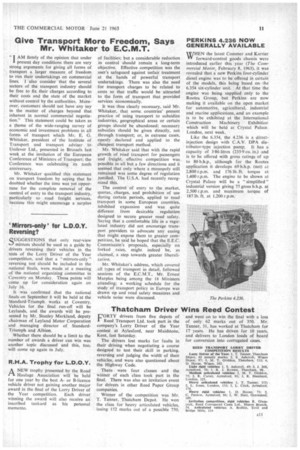Give Transport More Freedom, Says Mr. Whitaker to E.C.M.T.
Page 13

If you've noticed an error in this article please click here to report it so we can fix it.
I
" AM firmly of the opinion that under
present day conditions there are very strong arguments for giving all forms of transport a larger measure of freedom to run their undertakings on commercial lines. I also consider that the several sectors of the transport industry should be free to fix their charges according to their costs and the state of the market without control by the authorities. Moreover, customers should not have any say in the matter of charges beyond that inherent in normal commercial negotiation." This statement could be taken as a theme of the wide-ranging survey of economic and investment problems in all forms of transport which Mr. E. G. Whitaker, president of the Institute of Transport and transport adviser to Unilever Ltd., presented in Brussels last week at the invitation of the European Conference of Ministers of Transport; the Conference was celebrating its tenth anniversary.
Mr. Whitaker qualified this statement on transport freedom by saying that he doubted whether the time was yet opportune for the complete removal of the control of entry to the transport industry, particularly to road freight services. because this might encourage a surplus of facilities; but a considerable reduction in control should remain a long-term objective. Effective competition was the user's safeguard against unfair treatment at the hands of powerful transport undertakings. There was also the need for transport charges to be related to costs so that traffic would be attracted to the form of transport that provided services economically.
It was thus clearly necessary, said Mr. Whitaker, that some countries' present practice of using transport to subsidize industries, geographical areas or certain groups should be abandoned; necessary subsidies should be given directly, not through transport; or, in extreme cases, openly declared and applied to the cheapest transport method.
Mr. Whitaker said that with the rapid growth of road transport for passengers and freight, effective competition was possible in all but, a few directions and it seemed that only where a monopoly still remained was some degree of regulation justified. The U.S.A. had recently recognized this.
The control of entry to the market, quotas, charges, and prohibition of use during certain periods, applied to road transport in some European countries, inhibited expansion and was quite different from desirable regulation designed to secure greater road safety. Saying that a comfortable life in a regulated industry did not encourage transport providers to advocate any easing that might expose them to greater competition, he said he hoped that the E.E.C. Commission's proposals, especially on forked rates, might indeed be, as claimed, a step towards greater liberalization.
Mr. Whitaker's address, which covered . all types of transport in detail, followed sessions of the E.C.M.T., Mr. Ernest Marples being among the 18 Ministers attending: a working schedule for the study of transport policy in Europe was drawn up and road safety measures and vehicle noise were discussed.




















































































































